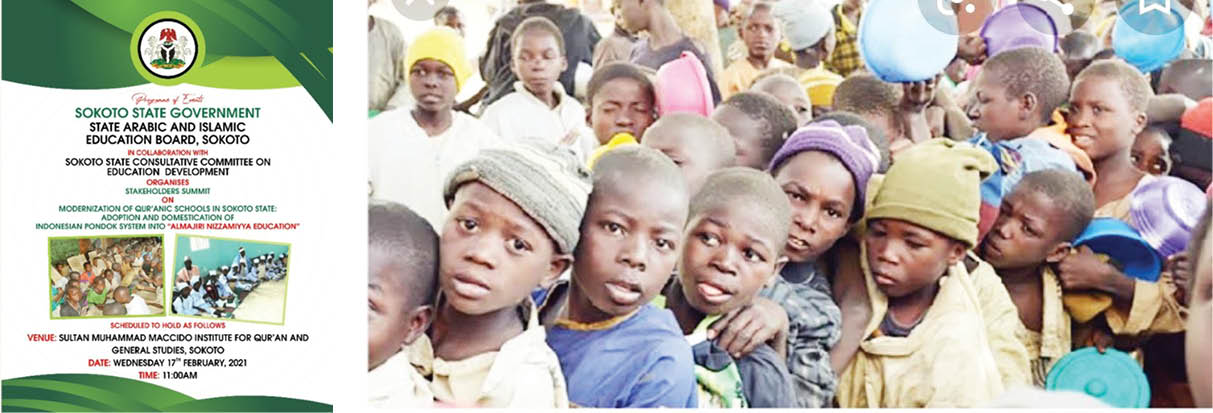If there is any issue that this Column, in its 15-year life, has concentrated on most consistently is the effort to find a lasting solution to the perennial Hausa/Fulani/Kanuri Arewa Muslim Number One Embarrassment called the Almajiri System which, in its current form, makes little children exposed to the vagaries of street begging, and then to hunger and penury and the vicissitudes of nature, all without nurture.
I have been a member of so many – actually too many – committees on this matter. At one time, I mentioned on this page that I have given up any hope of seeing the reform of the Tsangaya System because our political leaders have no will, strong or weak, to embark on it, and that I was no longer going to write or comment on or about it again. But then many of my seniors, especially the Wazirin Katsina and Alhaji Lawal Idris (a philanthropist follower of this page) called me up to say “You are going nowhere!”
Then the Sultan of Sokoto invited some of us and empaneled yet another committee at the Jama’atu Nasril Islam, JNI (the work of which was well covered on this page, as all memos and submissions were reproduced here). Then came Dr. Usman Bugaje’s National Summit on Almajirci (NSA) and then, finally, the Sokoto State Government’s Next Level on the Tsangaya matter; the start of the IMPLEMENTATION of a novel Model. This week, your Columnist was in Sokoto to witness the unveiling of this new action.
The Almajiri system, which we formally call Tsangaya (or Makarantar Allo) in Hausaland and Kanuriland; Katatib in Arabic-speaking North Africa; Madrasa in South Asia; and Pondok in the Bahasa-speaking South East Asia, predates colonialism by centuries in these Muslim lands – in fact more than a millennium in many. To wit, this was the only educational system in the lands of Islam but, for us here in West Africa, it has deteriorated so much so that almost everyone wanted it abrogated. Many state governments are already doing just, that in the quest for ‘integration’.
Sokoto State is, however, adopting the Indonesian Pondok System as Way Forward. This Indonesian model is a boarding school system consisting of a mosque, hostels and classrooms. Apart from learning the Glorious Quran and classical Islamic texts, the Pondok is concerned with the inculcation of moral discipline, spiritual inspiration, and instilling the spirit of self-reliance, nationalism and patriotism in the students.
The Pondok is a system whereby the school environment forms part of the student’s life right from his childhood. The schools also serve as boarding houses for the children that came from near and far places. The students do acquire formal education right from primary school up to the University level.
Pondok is the main secret behind the all-round development of Indonesia. This is due to the fact that the discipline, commitment, hospitality and humility that manifests in Indonesian nationals at all levels, at all times and in all destinations can be directly attributed to the inspiration of the Pondok system. Indonesian nationals are generally attached to their Pondok regardless of their social or economic class and, decades after graduating, they form strong bonds with their former schools for all manners of assistance.
For those who go on Hajj in Saudi Arabia, the legendary conduct of Indonesian pilgrims is a direct effect of the Pondok which instils moral training, spiritual inspiration and character molding and inculcation of patriotism. And this is what Sokoto is adapting and adopting as it believes it can help eradicate itinerant begging by underage children, indiscipline and other moral degeneration of youths.
The adoption of this system by Sokoto State is consequent upon studies of all options and, finally, a collaborative visit to Indonesia by the Sokoto State project stakeholders – Arabic and Islamic Education Board; the Zakat and Hubsi Commission; the Ministry of Basic and Secondary Education; and Governor Aminu Waziri Tambuwal.
More than that, in the buildup to the implementation of the Pondok system, all high-ranking public servants in Sokoto State, especially commissioners, were made to become Chairmen and Members of their local Quar’anic Schools Old Boys Associations. The system has been blessed by the Sultanate, the Ulama, parents and all stakeholders.
The adoption of the Pondok system now means that all Tsangaya students will learn the Boko (or Western) education comprising the numerate and literate sciences. In addition, each student will have to learn a craft through the embedded entrepreneurial skill acquisition component. At the end of the equivalent of a secondary education, students will be eligible for WAEC, NECO, NABTEB, NBAIS and all similar examinations, and can go for any discipline like any ‘Danboko’ – medicine, law, engineering, mass communication.
The Almajiri issue had embarrassingly become such an all-comers affair that even our Christian compatriots are trying to help us solve a 100% Muslim problem. The Kukah Centre, for example, had come in with a big bang; intervening with millions of Euros to help us sweep the matter under the carpet, once and for all. There is talk of skills acquisition and other social and economic goods; but no child will be proselytised. We repeat – no Muslim child will ever be proselytised. Those young Borno IDP boys in an Edo convent where they find it easier to hymn Halleluyah! than to intone La ilaha illalLah is just by the way. And the Kukah Centre is said to be royally supported.
The Northern Governors’ Forum (NGF) has, over the past several decades, ‘mainstreamed’ (a popular terminology used by the particularly savvy) the matter of the Almajiri and its solution into their regular Agendas. They will discuss, empanel committees, hear reports, appoint yet more committees, hear reports, yet again appoint…ad infinitum! So, why don’t they just ‘finitum’ and give up? Now they have the Sokoto Model to consider.
With the buy-in of the Sultan of Sokoto and, to be expected, the entire Muslim Traditional Rulers and Ulama in the country, it is the hope of this Column, and all Muslims of goodwill, that this adaptation of the Indonesian Pondok System for our Tsangaya Schools will have the buy-in of all other Muslim-majority states so that this perennial pain-in-the-neck embarrassment will be waved goodbye in a few years hence.
May Allah make the Sokoto Model of Pondok Tsangaya successful and sustainable, so that we rejoice in the absence of Almajiri on the streets of Kano, Maiduguri and Sokoto, in sha Allah.

 Join Daily Trust WhatsApp Community For Quick Access To News and Happenings Around You.
Join Daily Trust WhatsApp Community For Quick Access To News and Happenings Around You.


